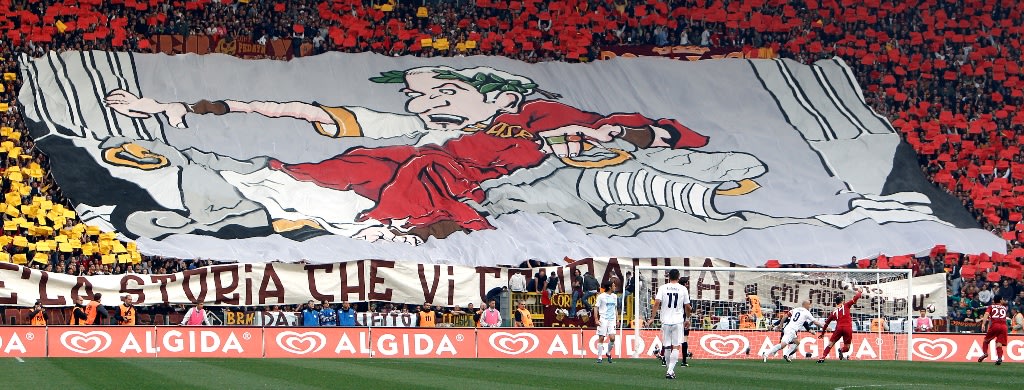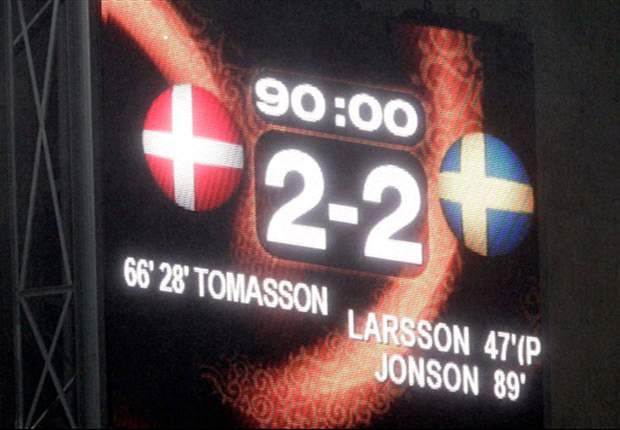My name is Nick and I'm a Eurosnob; an American soccer fan whose allegiance lies with a European club. As proof of my Eurosnobbery I will refer to the game as football and soccer interchangeably. I admit this not with pride but with resignation. I have tried
—for a decade
—to watch soccer without an aesthetic bent and in so doing take part in the burgeoning American scene. But I can't do it.
Why does this matter? The 2014 Major League Soccer season started this weekend and the World Cup kicks off in a little over three months. Soccer is bound to creep even more into the crowded headlines of American sport. The US's chances of advancing out of a tough first round group will be discussed, as will the question of if and when soccer will become mainstream in the American consciousness. The purpose of this piece is not to attempt to explain why soccer has not caught on as a spectator sport stateside. Rather, it is to explain why I am apathetic (but respectful) toward American soccer in general.
My club loyalty lies as AS Roma of the Italian Serie A. While I am of Italian origin, that isn't the only reason why Italian football appeals to me. I like it because of the insane passion of the fans and the tactical nuances. The former has its ugly side: fans racially taunting black players, shining laser pointers in the eyes of free kick takers, littering the pitch with plastic water bottles, etc. But these unsavory instances are more than compensated for by the palpable tension and drama that surrounds each match.
 |
| Historians are certain that Caesar supported Roma while Pompey was a Lazio Fan |
Tactics is everything in football. Part of this has to do with the rules: the only restriction regarding formations is that there must be one goalkeeper and ten outfield players. Formations come and go like fads. Today's 4-3-3 is yesterdays 4-4-2. Different countries have different theories about how to approach the game. For example, Italy lacks true wingers so Italian sides typically rely upon the fullbacks to both defend and go forward on the wings to contribute to the attack. Tactics is also a big deal because unlike in other sports (basketball, hockey and American football among others) football substitutions are limited to just three per side. So if a manager misjudges his counterpart's strategy, it could cost him the match even if he has the chance to switch things up by making a change. The manager also can only really communicate with the players before the match and during the halftime interval given the lack of stops and crowd noise. Getting the tactics right is crucial and allows little room for error.
 |
| Because playing with a centre forward is so mainstream... |
A lot of this tactical awareness is less important in MLS since many sides use a so-called workman's approach to the game. The idea of this is to play the ball up the wings and cross it into the box where the forwards can pounce on it and drive it toward goal. Alternatively teams will boot the ball upfield in hopes of allowing the forwards to slip in past the defensive line (thus avoiding offsides), leading to a fast break opportunity. Like any style of play, these tactics can be effective with the right players. But they don't allow the viewer much excitement. It is simply boring to see teams resorting to the long ball and "head tennis" because they lack on the ball skill. Similarly it is less fun to see a defender sloppily hack the ball out of danger instead of calmly and confidently playing it to a nearby teammate in his own half (though there are times when the former is the only option).
This is where creativity comes in. Vision. The ability to read a defense and make that impossible pass to a teammate at just the right time. American soccer suffers from a lack of players that can do this effectively. Many argue that this is because the game is taught at the youth level in a manner that emphasizes constant running and team work rather than slowness and individual flair. The problem with this stance is that it disregards the possibility (or even probability) that a player blessed with essentially unteachable on the ball skills can also contribute to the team by sharing the ball when needed. Soccer is a game in which creativity is often needed in order to score goals. A player who is brilliant on the ball is not necessarily a ballhog (Arjen Robben being an exception), and letting that player have free rein with the ball draws defenders onto him, thus allowing him to pass to an open teammate. This type of player is called the
trequartista in Italian, he usually wears the 10 shirt and is set up behind the strikers. The playmaking role is hardly unique to Italian football, but these types of players are more prevalent in countries in which creativity and individual brilliance is prized over the ability to be selfless and run hard throughout the match. The US have a player of this stripe in Landon Donovan, though his performances for the national team and San Jose and Los Angeles in the MLS have far outshone his mediocre numbers while playing in Europe.
 |
| Do you recognize this man, America? |
This all being said, MLS deserves some commendation. Take growth for instance; from its modest beginnings of 10 franchises in 1996, the league has swelled to 19 teams. By next season that number will be 21, with Orlando and the second NYC metropolitan area team joining the fold (as of now only LA has two teams). Parity is also one of its strong suits. In its 18 seasons, no fewer than 9 teams have lifted the MLS Cup. To put that in perspective, over the last 18 seasons, only 4 teams have won the English Premier League. This lack of parity is common in Europe: just 5 different teams have won the Serie A, 4 Spanish teams have won La Liga, incredibly only 2 clubs have won the Scottish Premiership in that time. It is also exciting to be involved with something from its inception. If you follow a European club this is impossible since the vast majority of them were founded in either the late 19th century or early 20th century. Many clubs "fetishize" their glorious past and or humble founding (1860 Munchen, Bayer 04 Leverkusen, Hannover 96 to name but a few German examples). Also, while racial abuse by fans toward players has improved in some parts of Europe (England) more so than in others (Italy unfortunately), this problem is essentially unheard of in MLS.
 |
| Age matters apparently |
However, for all MLS's strengths, the league still has a long way to go to make it more watchable. This could be helped if the league considered using a relegation/promotion system, where the bottom teams in the top division are relegated to the second division and replaced by the top teams in the second division for the next season. Sponsorship money goes down when a team is relegated to a league with fewer spectators. This prevents a team from being very bad for a long period of time (Chivas USA have missed the MLS playoffs four years in a row). This system is ubiquitous in Europe because the top and lower leagues are old and interconnected. This is not the case in MLS, so one is deprived of one of the hidden pleasures of football: end of the season relegation "playoffs" where bad teams desperately fight for the right to remain amid the glamour of the top division, if only for one more season.
Integrating promotion/relegation into the MLS would be a gargantuan undertaking and would theoretically defy the league's plan of adding franchises and so growing the sport. The problem also remains of whether MLS fans would still support their team if it was relegated to the second tier North American Soccer League. Alternatively the MLS could simply split in two, but the question of continued support would still be there, plus there would be no even split unless the league has an even number of clubs (it doesn't and won't next year). Despite these valid concerns, a system that rewards competence and penalizes incompetence would certainly improve the quality of play in MLS, and many have been clamoring for this type of change.
For some American soccer fans my disdain for the MLS would make me the object of endless scorn. Those more tolerant would argue that I merely want to watch a league with some of the world's greatest players, the same way a Turkish NBA fan may be less passionate about the Turkish Basketball League. I am a football aesthete. One of the reasons I chose to support Roma is because they have always played a free-flowing attacking type of football. Those more open-minded would accept my Eurosnobbery as long as I still support Team USA.
 |
| Great kit, not so great team |
Well I'm sorry to disappoint everyone but the truth is I only have room in my heart for one national team and that team is Italy. I played soccer a little as a kid (who in America hasn't really?) and I did watch some MLS in its inaugural season, but I was drawn to the European game first. I think it all began by happening on a Champions League telecast one afternoon after school in 2001 or 2002. To borrow a hackneyed phrase, it was love at first sight. After that I started watching Serie A on Sundays via a frequently fuzzy and hopelessly ancient feed on WYBE, a local public television station. It was an almost seamless transition from being soccer ignorant to cognizant of the pantheon of the world's greatest players, Italian or otherwise. Perhaps it is shallow to admit it, but the lack of American players among the world's elite at least partially drew me away from the US national team. The other factor drawing me toward supporting the Azzurri is my ethnicity and that many Roma players have played for both club and country, whereas it was not until 2012 that Roma signed an American player (Michael Bradley, who is now back in the MLS).
 |
| NEVER FORGET |
When you support a team that has won four World Cups and one European Championship you are always ready to defend yourself from those calling you a bandwagoner. I celebrated when Italy won the 2006 World Cup, and I also won runner up in my high school's tournament pool. But in order to justify celebrating that victory I had to endure the offensive ineptitude of the Euro 2004 campaign, in which Italy failed to qualify out of a supposedly easy first round group. When South Korea eliminated Italy in the 2002 World Cup knockout rounds I was befuddled, and the 2010 World Cup is inextricably linked with the word
vergogna. A bandwagon fan is marked by inconsistency. I have been consistent in supporting Italy, it just so happens that they have won the World Cup and finished runners up in the Euro championship since I have been a fan.
 |
| You probably remember this... |
 |
| But do you remember this too? |
To me the biggest threat to American soccer is not the fan like myself, loyal to a single foreign club and country. Rather it is those who support multiple teams and countries, just so long as they are not American. You know the types: Real Madrid/Barcelona fan when watching La Liga, Man United/City/Liverpool/Arsenal/Chelsea "diehard," Juventus/Milan/Inter supporter and Bayern Munich fanatic all rolled into one. Oh I forgot P$G in there but you get the idea. Furthermore I don't understand those Americans that root
against the US national team (besides Mexicans due to their rivalry).
I try to be as neutral a fan as possible in games not involving my teams, though I admit that neutrality only goes so far. Neutrality bows to circumstance. For example, I would not have been upset if Ukraine had qualified out of their Euro 2012 first round group because it would have been a proper sending off for their captain Andriy Shevchenko. I spent years rooting against Sheva as a Milan player especially, but he was probably the greatest pure striker in the world in his prime. It would have been a nice human interest story to see him win something in a Ukraine shirt. That didn't happen as Ukraine finished third in their group. However, it was great to see him end his international career by scoring two goals in a win over Sweden in front of his home fans (Ukraine co-hosted the tournament with Poland). Of course, Ukraine weren't in Italy's group in that tournament. Had they been, this entire human interest story wouldn't have appealed to me. Sheva and his countrymen would have been the adversary and nothing more (as they were in the 2006 quarterfinal when Italy trounced them three-nil).
 |
| #RESPECT |
So to sum up: I watch football that I am culturally and aesthetically attracted to. I'll still watch some MLS this year as a neutral with the slightest bias toward the Philadelphia Union. If they do well, I'll be happy the same way a father would be happy if his son's high school team made regionals. Content but not triumphant. As for the US national team, I hope they win the World Cup if Italy doesn't. Though who am I kidding, either Brazil or Argentina will end up winning it. So I'm still partisan toward the game I love but every football fan is partisan one way or another.









No comments:
Post a Comment